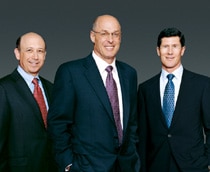 |
 |
 |
From left to right:
Lloyd C. Blankfein
Henry M. Paulson, Jr.
John A. Thain
On January 14, 2004, John Thain retired as President and Chief Operating Officer of Goldman Sachs to become Chief Executive Officer of the New York Stock Exchange. John was succeeded by Lloyd C. Blankfein.
We are very proud that John was selected for this role, following in the tradition of service established by many generations of Goldman Sachs leaders.
John had a long and successful career at Goldman Sachs, distinguished by his character, rigorous intellect and devotion to the firm's culture. He helped Goldman Sachs transition from a private partnership to a public corporation, encouraged new business development, and spearheaded many initiatives to strengthen the firm's culture and develop our people.
All of us at Goldman Sachs are profoundly grateful to John for his many lasting accomplishments at the firm.
|
 |
 |
|

Looking back on 2003, we take pride in our performance during a very challenging year. Net earnings in 2003 were $3.01 billion, a 42% increase from 2002. Earnings per diluted share (EPS) were $5.87, a 46% increase from 2002, and our second highest reported EPS as a public company. Our 2003 return on average shareholders' equity was 15%, up from 11% in 2002. Our return on average tangible shareholders' equity was 20%, well above the 15% earned in 2002.
By its nature, our business doesn't lend itself to predictable recurring earnings. As we often remind our people, Goldman Sachs cannot control the market environment in which we work. But we can control our relative performance. By this standard, we judge 2003 to be a success and further evidence of the strength and resilience of our franchise.
Despite our success in 2003, most of us will remember the past year as one in which we faced the continuing fallout from the collapse of the high-tech bubble and the series of corporate scandals that followed. It was an environment marked by sharp criticism and intense scrutiny of corporations generally, and financial services firms in particular.
At Goldman Sachs, we continue to experience enhanced regulatory scrutiny in all areas of our business. While at times not without challenges, we see this as an opportunity to learn from our mistakes, and those of others, as we strive to do all we can to restore investor confidence, to improve the structure and practices of financial markets and, above all, to strengthen our own policies and procedures. Our highest priority is to enhance our reputation for integrity in everything we do.
It is a challenging agenda and the implications are far-reaching. Success will, to a large degree, be measured by the extent to which financial institutions like Goldman Sachs can continue to operate effectively. This is important because the role played by integrated investment banks—which bring together the providers and users of capital—is central to well-functioning capital markets and to sustained global growth. Firms like ours are in many ways agents of change. We facilitate entrepreneurship and innovation, help create opportunities for individuals and companies alike, and act as a catalyst for economic reform around the world.
This year our letter is a little longer than usual because we address in more detail some of the most important opportunities and issues we face as a firm.
|
 |
 |
1 / 6 |
 |
1 / 6 |
|